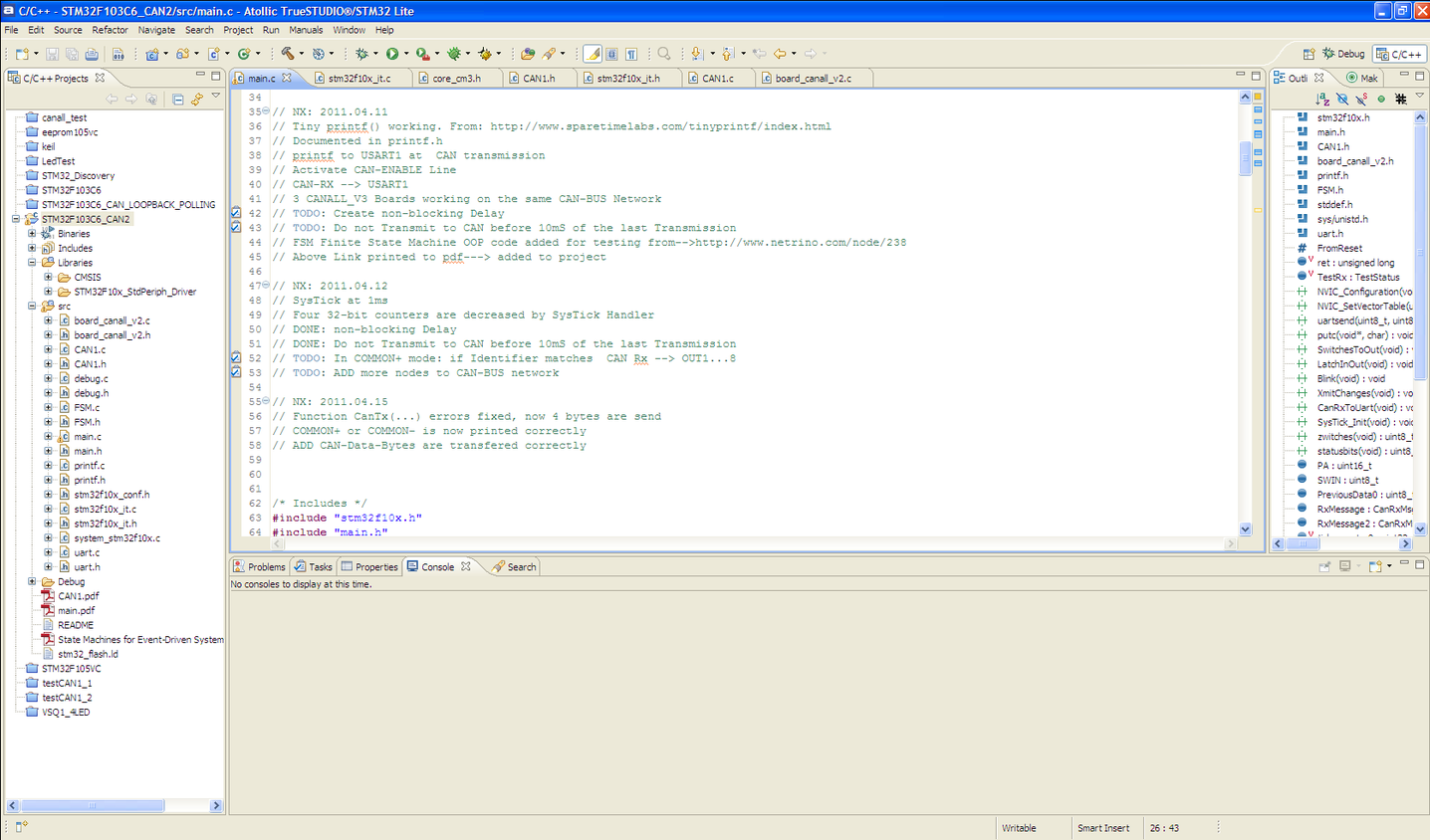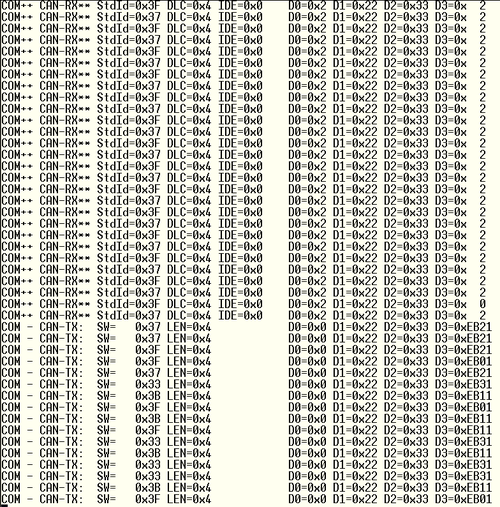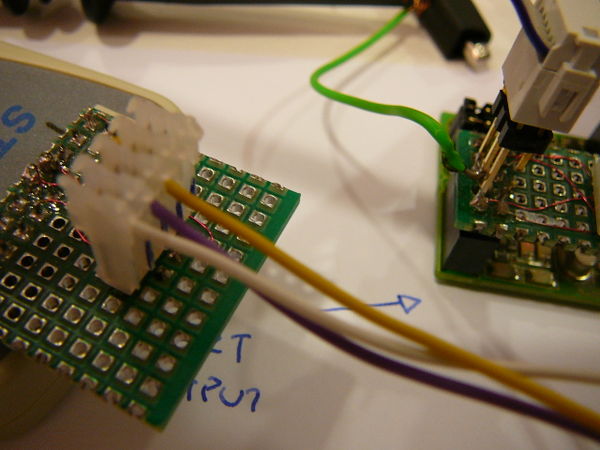Difference between revisions of "Project STM32F103C6 CAN"
From emboxit
m (1 revision) |
|
(No difference)
| |
Latest revision as of 16:51, 11 September 2015
Project STM32F103C6_CAN
- canALL_V2 boards connected on CAN-BUS network
- Software on
- Atollic TrueSTUDIO®/STM32 Lite, Built on Eclipse.
- Version: 2.0.1 Lite
- Build id: 20110128-1032
- Send to CAN only when an input is changed
- All Receiving boards transmit to UART
- CAN-BUS can be monitored on PC Terminal Emulator
- On progress:
- Use board addressing to activate outputs from other board inputs
- // TODO: In COMMON+ mode: if Identifier matches CAN Rx --> OUT1...8
// NX: 2011.03.17
// FROM STM32F103C6_CAN_LOOPBACK_POLLING, FROM testCAN1_1 of ThanasisPolitis, after some effort
// testCAN1.c updated: Normal mode instead loopback, transmit only once, correct baud rate 125KHz (=8us)
// TODO: send to CAN every 10ms
// TODO: HOWTO define APB1 clock (now set to 36MHz) Try 8,16,24 MHz
// NX: 2011.03.30
//
// NX: 2011.04.6
// board.c,h renamed to board_canall_v2
// DSW6..1 now pull-up inputs as in canall_v2. (previous definition was for board FLO)
// NX: 2011.04.07
// DSW1..6 TO OUTPUTS 1-6
// TODO: SOLVE DSW6 NOT PULLED-UP
// NX: 2011.04.08
// DONE: SOLVE DSW6 NOT PULLED-UP, ...Had to enable AFIO clock
// IN1..8 Latched for COMMON+ (both jumpers RIGHT)
// IN1 and IN2 only Latched for COMMON- (both jumpers LEFT) IN3..8, do-nothing
// ONLY for COMMON-, DSDW1...6 activate OUT3...8
// One led blinks at every main-loop
// The other led blinks when there is a change in the outputs OUT1..8
// Send a CAN transmission at every output change which contains OUT1...8
// TODO: Send DSW1...6 as Identifier, Send IOCOMLV Bit, Send FROM-RESET Bit
// TODO: CAN RX to UART for any Identifier
// TODO: In COMMON+ mode: if Identifier matches CAN Rx --> OUT1...8
// TODO: Check Data Passed
// NX: 2011.04.09
// DONE: Send DSW1...6 as Identifier(whenever changes), Send IOCOMLV (BIT 1), Send FROM-RESET (BIT 0)
// Send FROM-RESET Bit
// UART function working, iprintf not working.
// NX: 2011.04.11
// Tiny printf() working. From: http://www.sparetimelabs.com/tinyprintf/index.html
// Documented in printf.h
// printf to USART1 at CAN transmission
// Activate CAN-ENABLE Line
// CAN-RX --> USART1
// 3 CANALL_V3 Boards working on the same CAN-BUS Network
// TODO: Create non-blocking Delay
// TODO: Do not Transmit to CAN before 10mS of the last Transmission
// FSM Finite State Machine OOP code added for testing from-->http://www.netrino.com/node/238
// Above Link printed to pdf---> added to project
// NX: 2011.04.12
// SysTick at 1ms
// Four 32-bit counters are decreased by SysTick Handler
// DONE: non-blocking Delay
// DONE: Do not Transmit to CAN before 10mS of the last Transmission
// TODO: In COMMON+ mode: if Identifier matches CAN Rx --> OUT1...8
// TODO: ADD more nodes to CAN-BUS network
// NX: 2011.04.15
// Function CanTx(...) errors fixed, now 4 bytes are send
// COMMON+ or COMMON- is now printed correctly
// ADD CAN-Data-Bytes are transfered correctly
/* Includes */
#include "stm32f10x.h"
#include "main.h"
#include "CAN1.h"
#include "board_canall_v2.h"
#include "printf.h" // NX: From: http://www.sparetimelabs.com/tinyprintf/index.html
#include "FSM.h"
// from main.c --> http://zrusavpt-eagle.googlecode.com/svn-history/r33/trunk/STM32/uart_vl_discovery/src/
#include <stddef.h>
//#include <stdio.h> // NX: made comment to avoid conflict with tiny-printf definitions
#include <sys/unistd.h>
// #include "stm32f10x.h"
// #include "STM32_Discovery.h"
// debug.c,h uart.c,h Downloaded from-> http://zrusavpt-eagle.googlecode.com/svn-history/r33/trunk/STM32/uart_vl_discovery/src/
// #include "debug.h"
#include "uart.h" // from-> http://zrusavpt-eagle.googlecode.com/svn-history/r33/trunk/STM32/uart_vl_discovery/src/
#define FromReset 0x01 // NX: BIT SET only at the beginning of main() for a single CAN transmission then is RESET
// #define __IO volatile /*!< defines 'read / write' permissions */
__IO unsigned long ret = 0; /* for return of the interrupt handling */
volatile TestStatus TestRx;
void NVIC_Configuration(void);
void NVIC_SetVectorTable(uint32_t NVIC_VectTab, uint32_t Offset);
void uartsend(uint8_t d0, uint8_t d1, uint8_t d2, uint8_t d3, uint8_t d4, uint8_t d5, uint8_t d6, uint8_t d7, uint8_t d8, uint8_t d9);
void putc ( void* p, char c);
void SwitchesToOut(void);
void LatchInOut(void);
void Blink(void);
void XmitChanges(void);
void CanRxToUart(void);
void SysTick_Init(void);
uint8_t zwitches(void);
uint8_t statusbits(void);
uint16_t PA;
uint8_t SWIN;
uint8_t PreviousData0;
CanRxMsg RxMessage;
CanRxMsg RxMessage2;
volatile uint32_t tick_counter0;
volatile uint32_t tick_counter1;
volatile uint32_t tick_counter2;
volatile uint32_t tick_counter3;
/*********************************************************************************/
//void Delay(vu32 nCount)
//{
// for(; nCount != 0; nCount--);
//}
/**===========================================================================
**
** Abstract: main program
**
**===========================================================================
*/
int main(void) {
// Keyboard k;
// KeyboardCtor(&k);
// FsmInit((Fsm *)&k, 0);
SystemInit(); // Setup STM32 system (clock, PLL and Flash configuration)
InitBoardCanall();
InitializeUarts();
init_printf(NULL,putc);
SysTick_Init();
CAN1_setup();
CanTx(zwitches(),0x04, FromReset,0x22,0x33,0x44); // [Identifier,length,data1,data2,data2,data3]
CanTxWait();
while (1) {
Blink();
SwitchesToOut();
LatchInOut();
if (tick_counter0 == 0) XmitChanges();
CanRxToUart();
// KeyboardEvt ke;
// printf("\nSignal<-");
// ke.code = getc(stdin);
// getc(stdin); /* discard '\n' */
// switch (ke.code) {
// case '^':
// ke.super_.sig = SHIFT_DEPRESSED_SIG;
// break;
// case '6':
// ke.super_.sig = SHIFT_RELEASED_SIG;
// break;
// case '.':
// return 0; /* terminate the test */
// default:
// ke.super_.sig = ANY_KEY_SIG;
// break;
// }
// FsmDispatch((Fsm *) &k, (Event *) &ke); /* dispatch */
}//while(1) end
}//main end
uint8_t zwitches(void){
uint8_t SW;
SW = 1 * GPIO_ReadInputDataBit(GPIOB, GPIO_Pin_15)
+ 2 * GPIO_ReadInputDataBit(GPIOB, GPIO_Pin_14)
+ 4 * GPIO_ReadInputDataBit(GPIOB, GPIO_Pin_13)
+ 8 * GPIO_ReadInputDataBit(GPIOB, GPIO_Pin_12)
+ 16 * GPIO_ReadInputDataBit(GPIOB, GPIO_Pin_11)
+ 32 * GPIO_ReadInputDataBit(GPIOB, GPIO_Pin_3);
return SW;
}//uint8_t switches(void){
uint8_t statusbits(void){
uint8_t BITS;
BITS = 2 * GPIO_ReadInputDataBit(GPIOA, GPIO_Pin_8); // NX: IOCOMLV line of Board
return BITS;
}
void uartsend(uint8_t d0, uint8_t d1, uint8_t d2, uint8_t d3, uint8_t d4, uint8_t d5, uint8_t d6, uint8_t d7, uint8_t d8, uint8_t d9){
USART_SendData(USART1, d0);
while (USART_GetFlagStatus(USART1, USART_FLAG_TC) == RESET) {}
USART_SendData(USART1, d1);
while (USART_GetFlagStatus(USART1, USART_FLAG_TC) == RESET) {}
USART_SendData(USART1, d2);
while (USART_GetFlagStatus(USART1, USART_FLAG_TC) == RESET) {}
USART_SendData(USART1, d3);
while (USART_GetFlagStatus(USART1, USART_FLAG_TC) == RESET) {}
USART_SendData(USART1, d4);
while (USART_GetFlagStatus(USART1, USART_FLAG_TC) == RESET) {}
USART_SendData(USART1, d5);
while (USART_GetFlagStatus(USART1, USART_FLAG_TC) == RESET) {}
USART_SendData(USART1, d6);
while (USART_GetFlagStatus(USART1, USART_FLAG_TC) == RESET) {}
USART_SendData(USART1, d7);
while (USART_GetFlagStatus(USART1, USART_FLAG_TC) == RESET) {}
USART_SendData(USART1, d8);
while (USART_GetFlagStatus(USART1, USART_FLAG_TC) == RESET) {}
USART_SendData(USART1, d9);
while (USART_GetFlagStatus(USART1, USART_FLAG_TC) == RESET) {}
}
void putc ( void* p, char c)
{
while (USART_GetFlagStatus(USART1, USART_FLAG_TC) == RESET) {}
USART_SendData(USART1, c);
}
void SwitchesToOut(void){
uint8_t inputDSW;
inputDSW = GPIO_ReadInputDataBit(GPIOB, GPIO_Pin_15);
if (inputDSW == 0) {GPIO_SetBits(GPIOA, GPIO_Pin_2);}
else {GPIO_ResetBits(GPIOA, GPIO_Pin_2);}
inputDSW = GPIO_ReadInputDataBit(GPIOB, GPIO_Pin_14);
if (inputDSW == 0) {GPIO_SetBits(GPIOA, GPIO_Pin_3);}
else {GPIO_ResetBits(GPIOA, GPIO_Pin_3);}
inputDSW = GPIO_ReadInputDataBit(GPIOB, GPIO_Pin_13);
if (inputDSW == 0) {GPIO_SetBits(GPIOA, GPIO_Pin_4);}
else {GPIO_ResetBits(GPIOA, GPIO_Pin_4);}
inputDSW = GPIO_ReadInputDataBit(GPIOB, GPIO_Pin_12);
if (inputDSW == 0) {GPIO_SetBits(GPIOA, GPIO_Pin_5);}
else {GPIO_ResetBits(GPIOA, GPIO_Pin_5);}
inputDSW = GPIO_ReadInputDataBit(GPIOB, GPIO_Pin_11);
if (inputDSW == 0) {GPIO_SetBits(GPIOA, GPIO_Pin_6);}
else {GPIO_ResetBits(GPIOA, GPIO_Pin_6);}
inputDSW = GPIO_ReadInputDataBit(GPIOB, GPIO_Pin_3);
if (inputDSW == 0) {GPIO_SetBits(GPIOA, GPIO_Pin_7);}
else {GPIO_ResetBits(GPIOA, GPIO_Pin_7);}
}//void SwitchesToOut(void){
void LatchInOut(void){
uint8_t inputDSW;
if (GPIO_ReadInputDataBit(GPIOA, GPIO_Pin_8) !=0){
inputDSW = GPIO_ReadInputDataBit(GPIOB, GPIO_Pin_0); // IN1
if (inputDSW == 0) {GPIO_SetBits(GPIOA, GPIO_Pin_0);} // TO
else {GPIO_ResetBits(GPIOA, GPIO_Pin_0);} // OUT1
inputDSW = GPIO_ReadInputDataBit(GPIOB, GPIO_Pin_1); // IN2
if (inputDSW == 0) {GPIO_SetBits(GPIOA, GPIO_Pin_1);} // TO
else {GPIO_ResetBits(GPIOA, GPIO_Pin_1);} // OUT2
inputDSW = GPIO_ReadInputDataBit(GPIOB, GPIO_Pin_5); // IN3
if (inputDSW == 0) {GPIO_SetBits(GPIOA, GPIO_Pin_2);} // TO
else {GPIO_ResetBits(GPIOA, GPIO_Pin_2);} // OUT3
inputDSW = GPIO_ReadInputDataBit(GPIOB, GPIO_Pin_8); // IN4
if (inputDSW == 0) {GPIO_SetBits(GPIOA, GPIO_Pin_3);} // TO
else {GPIO_ResetBits(GPIOA, GPIO_Pin_3);} // OUT4
inputDSW = GPIO_ReadInputDataBit(GPIOB, GPIO_Pin_9); // IN5
if (inputDSW == 0) {GPIO_SetBits(GPIOA, GPIO_Pin_4);} // TO
else {GPIO_ResetBits(GPIOA, GPIO_Pin_4);} // OUT5
inputDSW = GPIO_ReadInputDataBit(GPIOB, GPIO_Pin_10); // IN6
if (inputDSW == 0) {GPIO_SetBits(GPIOA, GPIO_Pin_5);} // TO
else {GPIO_ResetBits(GPIOA, GPIO_Pin_5);} // OUT6
inputDSW = GPIO_ReadInputDataBit(GPIOC, GPIO_Pin_14); // IN7
if (inputDSW == 0) {GPIO_SetBits(GPIOA, GPIO_Pin_6);} // TO
else {GPIO_ResetBits(GPIOA, GPIO_Pin_6);} // OUT7
inputDSW = GPIO_ReadInputDataBit(GPIOA, GPIO_Pin_15); // IN8
if (inputDSW == 0) {GPIO_SetBits(GPIOA, GPIO_Pin_7);} // TO
else {GPIO_ResetBits(GPIOA, GPIO_Pin_7);} // OUT8
}// if end
else { //COMMON- [JUMPERS BOTH LEFT]
inputDSW = GPIO_ReadInputDataBit(GPIOB, GPIO_Pin_0); // IN1
if (inputDSW == 0) {GPIO_SetBits(GPIOA, GPIO_Pin_0);} // TO
else {GPIO_ResetBits(GPIOA, GPIO_Pin_0);} // OUT1
inputDSW = GPIO_ReadInputDataBit(GPIOB, GPIO_Pin_1); // IN2
if (inputDSW == 0) {GPIO_SetBits(GPIOA, GPIO_Pin_1);} // TO
else {GPIO_ResetBits(GPIOA, GPIO_Pin_1);} // OUT2
}//else end
}//void LatchInOut(){
void Blink(void){
GPIO_SetBits(GPIOC, GPIO_Pin_13);
//Delay((u32) 100000);
GPIO_ResetBits(GPIOC, GPIO_Pin_13);
//Delay((u32) 100000);
}//void Blink(void){
void XmitChanges(void){
if ( (PA != GPIO_ReadOutputData(GPIOA)) | (SWIN != zwitches()) ){ // NX: If any of OUT1...8 changes
GPIO_SetBits(GPIOC, GPIO_Pin_15); // LED ON
CanTx(zwitches(),0x04, statusbits(),0x22,0x33,PA); // [Identifier,length,data1,data2,data2,data3]
CanTxWait(); // Transmit to CAN
//Delay((u32) 100000);
GPIO_ResetBits(GPIOC, GPIO_Pin_15); // LED OF
PA= GPIO_ReadOutputData(GPIOA);
SWIN = zwitches();
if ( (2 & statusbits()) !=0) {
printf("COM++ ");
}
else {
printf("COM - " );
}
printf("CAN-TX: SW= 0x%X LEN=0x4 D0=0x%X D1=0x22 D2=0x33 D3=0x%X\n", zwitches(),statusbits(),PA);
tick_counter0 = 10; // Do Not Transmit before 10ms passed from previous Transmission
}//if ( (PA != ...
}//void XmitChanges(void){
void CanRxToUart(void){
CAN_Receive(CAN1, CAN_FIFO0, &RxMessage);
if (RxMessage.StdId != RxMessage2.StdId){
if ( (2 & RxMessage.Data[0]) !=0) {
printf("COM++ ");
}
else {
printf("COM - " );
}
printf("CAN-RX** StdId=0x%X DLC=0x%X IDE=0x%X D0=0x%X D1=0x%X D2=0x%X D3=0x %X\n", RxMessage.StdId,RxMessage.DLC, RxMessage.IDE ,
RxMessage.Data[0],RxMessage.Data[1],RxMessage.Data[2],RxMessage.Data[3]);
RxMessage2.StdId = RxMessage.StdId;
RxMessage.StdId=0x00;
RxMessage.IDE=CAN_ID_STD;
RxMessage.DLC=0;
RxMessage.Data[0]=0x00;
RxMessage.Data[1]=0x00;
RxMessage.Data[2]=0x00;
RxMessage.Data[3]=0x00;
}//if (RxMessage.StdId != RxMessage2.StdId){
}//void CanRxToUart(void){
void SysTick_Init(void)
{
SysTick->LOAD = 0x2300; // set reload register 0x2300 for 1ms
SysTick->VAL = 0x2300;
// SysTick->CTRL |= SysTick_CTRL_CLKSOURCE;
SysTick->CTRL |= SysTick_CTRL_ENABLE;
SysTick->CTRL |= SysTick_CTRL_TICKINT;
}
/*
* @brief Configures the NVIC and Vector Table base address.
* @param None
* @retval None
*/
void NVIC_Configuration(void)
{
NVIC_InitTypeDef NVIC_InitStructure;
/* Enable CAN1 RX0 interrupt IRQ channel */
#ifndef STM32F10X_CL
NVIC_InitStructure.NVIC_IRQChannel = USB_LP_CAN1_RX0_IRQn;
#else
NVIC_InitStructure.NVIC_IRQChannel = CAN1_RX0_IRQn;
#endif /* STM32F10X_CL*/
NVIC_InitStructure.NVIC_IRQChannelPreemptionPriority = 0;
NVIC_InitStructure.NVIC_IRQChannelSubPriority = 0;
NVIC_InitStructure.NVIC_IRQChannelCmd = ENABLE;
NVIC_Init(&NVIC_InitStructure);
}
- At every input change:
- change is transmitted to CAN
- Total STATUS of board is transmitted to UART
- Blue Channel CAN-BUS
- Purple Channel UART-TX
- ST-LINK to board
- UART to RS232 level converted board and then to PC serial port







